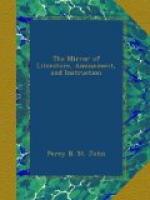The story of the young lady is short and melancholy. She was a daughter of Livingston of Dunipace, a courtier, and a favourite of James VI.; an ill-assorted marriage united her at an early age with the Laird of Warriston, a gentleman whom she did not love, and who apparently used her with brutal harshness. The Lady Warriston accused her husband of having struck her several blows, besides biting her in the arm; and conspired with her nurse, Janet Murdo, to murder him. The confidante, inspired by that half-savage attachment which in those days animated the connexion between the foster-child and the nurse, entered into all the injuries of which her dalt (i.e. foster daughter) complained, encouraged her in her fatal purpose, and promised to procure the assistance of a person fitted to act the part of actual murderer, or else to do the deed with her own hands. In Scotland, such a character as the two wicked women desired for their associate was soon found in a groom, called Robert Weir, who appears, for a very small hire, to have undertaken the task of murdering the gentleman. He was ushered privately into Warriston’s sleeping apartment, where he struck him severely upon the flank-vein, and completed his crime by strangling him. The lady in the meantime fled from the nuptial apartment into the hall, where she remained during the perpetration of the murder. The assassin took flight when the deed was done; but he was afterwards seized, and executed. The lady was tried, and condemned to death, on the 16th of June, 1600. The nurse was at the same time condemned to be burnt alive, and suffered her sentence accordingly; but Lady Warriston, in respect of her gentle descent, was appointed to die by the Maiden, a sort of rude guillotine, imported, it is said, from Halifax, by the Earl of Morton, while regent, who was himself the first that suffered by it.
The printed account of this beautiful murderess contains a pathetic narrative of the exertions of the worthy clergyman (its author) to bring her to repentance. At first, his ghostly comfort was very ill received, and she returned with taunts and derision his exhortations to penitence. But this humour only lasted while she had hopes of obtaining pardon through the interest of her family. When these vanished, it was no longer difficult to bring her, in all human appearance, to a just sense of her condition; her thoughts were easily directed towards heaven, so soon as she saw there was no comfort upon earth.
The pride of Lady Warriston’s parents suggested a petition that she might be executed betwixt five and six in the morning; but both the clergyman and magistrates seem to have consented unwillingly to this arrangement. The clergyman was particularly offended that the display of her penitence should not be as public as that of her guilt had been, and we may forgive the good man if there was any slight regret for a diminished display of his own success, as a religious assistant, mixed with this avowed dissatisfaction.—Quarterly Rev.




